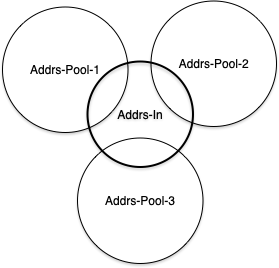Dynamic Routing
Dynamic routing for groovy scripts.
Based on the routing chain, the Pipeline processing method is adopted, as shown in the following figure:

The logic of the routing chain can be simply understood as target = rn(…r3(r2(r1(src)))). For the internal logic of each router, it can be abstracted as n disjoint address pools addrs-pool-1 … addrs-pool- n According to the implementation-defined rules, the intersection is taken as the output addrs-out. By analogy, the calculation of the entire routing chain is completed.

On the other hand, if router(n) needs to execute fallback logic, then the fallback logic should be determined after router(n)
After multiple conditional components between multiple routers, it is easy for the address to be filtered to be empty, so we need to perform fallback processing for this situation to ensure that the business can successfully find a valid address under the premise of correctness.
First we look at the following rules
apiVersion: service.dubbo.apache.org/v1alpha1
kind: VirtualService
metadata:
name: demo-route
spec:
hosts:
- demo // Uniformly defined as the application name
dubbo:
- service:
- exact: com.taobao.hsf.demoService:1.0.0
- exact: com.taobao.hsf.demoService:2.0.0
route details:
- name: sayHello-String-method-route
match:
-method:
name_match:
exact: "sayHello"
.....
argp:
- string
route:
-destination:
host: demo
subset: v1
fallback:
destination:
host: demo
subset: v2
fallback:
destination:
host: demo
subset: v3
- name: sayHello-method-route
match:
-method:
name_match:
exact: "s-method"
route:
-destination:
host: demo
subset: v2
fallback:
destination:
host: demo
subset: v3
- name: interface-route
route:
-destination:
host: demo
subset: v3
- service:
....
---
apiVersion: service.dubbo.apache.org/v1alpha1
kind: DestinationRule
metadata:
name: demo-route
spec:
host: demo
subsets:
- name: v1
labels:
sigma.ali/mg: v1-host
- name: v2
labels:
sigma.ali/mg: v2-host
- name: v3
labels:
sigma.ali/mg:v3-host
Let’s take script routing as an example. The matching conditions of this script routing follow a principle, that is, the matching range is a process from precise to broad. In this example, it is sayHello(string) parameter -> sayHello method -> A matching lookup process for interface-level routing.
So if we have met a certain condition, but the selected subset address is empty, how will we perform fallback processing?
Take the condition of matching sayHello(string) parameters as an example. We selected the v1 subset. If it is empty, we can go up to the next level to find the address, that is, to find the address at the method level. The specific configuration is as follows
- name: sayHello-String-method-route
match:
-method:
name_match:
exact: "sayHello"
.....
argp:
- string
route:
-destination:
host: demo
subset: v1
fallback:
destination:
host: demo
subset: v2
fallback:
destination:
host: demo
subset: v3
At this time, the address we selected is the v2 method-level address. If v2 still has no address, according to the definition of the rules, we can fallback to the v3 interface level.
Suppose we have a method matching, if there is no address, we need to report an error directly without fallback, we can configure it like this
apiVersion: service.dubbo.apache.org/v1alpha1
kind: VirtualService
metadata:
name: demo-route
spec:
hosts:
- demo // Uniformly defined as the application name
dubbo:
- service:
- exact: com.taobao.hsf.demoService:1.0.0
- exact: com.taobao.hsf.demoService:2.0.0
route details:
- name: sayHello-String-method-route
match:
-method:
name_match:
exact: "sayHello"
.....
argp:
- string
route:
-destination:
host: demo
subset: v1
fallback:
destination:
host: demo
subset: v2
fallback:
destination:
host: demo
subset: v3
- name: sayHello-method-route
match:
-method:
name_match:
exact: "s-method"
route:
-destination:
host: demo
subset: v2
fallback:
destination:
host: demo
subset: v3
- name: some-method-route
match:
-method:
name_match:
exact: "some-method"
route:
-destination:
host: demo
subset: v4
- name: interface-route
route:
-destination:
host: demo
subset: v3
- service:
....
---
apiVersion: service.dubbo.apache.org/v1alpha1
kind: DestinationRule
metadata:
name: demo-route
spec:
host: demo
subsets:
- name: v1
labels:
sigma.ali/mg: v1-host
- name: v2
labels:
sigma.ali/mg: v2-host
- name: v3
labels:
sigma.ali/mg:v3-host
From this rule, we can see that when the some-method condition is matched, it corresponds to the v4 subset, then when v4 is empty, because no fallback is configured, an error will be reported directly at this time

We see the above figure, in the routing process, we are the processing method of Pipeline, the Router nodes of Pipeline exist in order, and each Router has a unique corresponding VirtualService and multiple corresponding DestinationRules for description .
Take the routing rule configuration stored on Nacos as an example, the format of the configuration is as follows:
DataId: Demo.rule.yaml
GROUP: HSF
content:
Virtual Service A
---
DestinationRule A1
---
DestinationRule A2
---
Virtual Service B
---
DestinationRule B
---
VirtualServiceC
---
DestinationRule C
---
...
VirtualService A and DestinationRule A1, DestinationRule A2 form a Router A, VirtualService B and DestinationRule B form a Router B, and so on to complete the assembly of the entire router chain.
Dynamic routing for groovy scripts.
Realize routing function based on user-defined weight.
Make routing rules based on the actual situation.
On the premise that the old version on the line continues to run, deploy the new version directly and then test it. When the new version passes the test, switch the traffic to the new version, and finally upgrade the old version to the new version.
On the premise that the old version on the line continues to run, deploy the new version directly and then test it. When the new version passes the test, switch the traffic to the new version, and finally upgrade the old version to the new version.
Rules for inbound traffic
Destination address rule